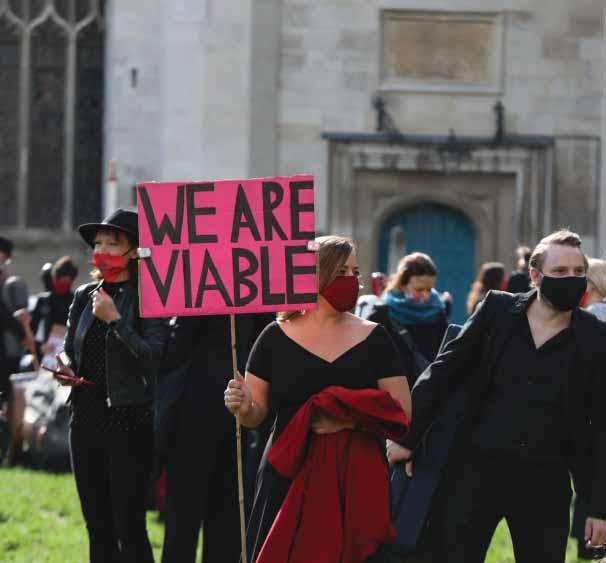
8 minute read
News & campaigns
Over 200 music organisations and 2200 musicians sign open letter to the Chancellor in support of joint ISM and Musicians Movement #MakeMusicWork campaign
As part of the #MakeMusicWork campaign launched by the ISM and Musicians’ Movement on 7 October, over 200 music organisations and 2200 musicians have signed an open letter to the Chancellor, Rishi Sunak, in support of the campaigns proposal to ensure musicians can start earning again. The campaign offers two clear and viable solutions for the Government to take forward that aim to get the creative industries safely back to work. The fi rst proposal is for a new Freelance Performers’ Support Scheme to facilitate the reopening of music venues under social distancing rules and see the return of live performances. This funding model would combine grants for venues and a guaranteed fee for each performer with a cultural exemption on VAT for tickets. With a guaranteed fee for each performer, this proposal puts freelancers at the heart of a sustainable funding model for venues. The campaign is also calling on the government to deliver on its pledge to ensure parity between employees and the self-employed by maintaining the existing level of support provided by the Self Employment Income Support Scheme (SEISS) and expanding the eligibility. Specifi cally, the criteria should meet the particular needs of creative freelancers, and those musicians whose income is derived from a mixture of employed and selfemployed work. The joint letter was coordinated to collaborate with the sector to develop and build support for the proposals, and for these measures to be implemented as a bridging scheme until the music sector can go back to work and start contributing fully to the economic and cultural health of the country once again. ISM continues to lobby for targeted fi nancial support as sector hit with devastating blow from Chancellor’s ‘Winter Economic Plan’ Chancellor Rishi Sunak unveiled his ‘Winter Economy Plan’ at the House of Commons on 24 September. While some employed workers may benefi t from the new Job Support Scheme, the measures announced for the self-employed were a devastating blow for the thousands of musicians who have had no income since March and still cannot return to work while venues remain closed. While the ISM welcomes the extension of the SelfEmployment Income Support Scheme (SEISS) until April 2021, three million self-employed workers continue to be excluded. Even those who are eligible will only receive 20% of their monthly trading profi ts, which will not provide an adequate safety net for our members when they are unable to generate any income at all. We have called on the government to deliver on its pledge to ensure there is parity between employees and the self-employed by maintaining the existing level of support provided by the SEISS and expanding the eligibility criteria. This announcement followed further lockdown restrictions imposed across the UK in an attempt to prevent a second wave of coronavirus. While safety is paramount, it is extremely disappointing that plans for reopening theatres and live music venues across the UK are now on hold. We desperately want to fi nd a way forward so that our members can start returning to work, as those in other industries have been able to do, while staying safe. That is why the ISM is campaigning for a Freelance Performers’ Support Scheme, which would enable live music events to take place in line with social distancing guidelines and include a guaranteed fee for performers. The Offi ce of National Statistics released its survey results on ‘Coronavirus and the economic impacts on the UK’ which shows that the arts, entertainment and recreation is the sector worst affected by coronavirus. Results show the industry had the largest proportion of the workforce furloughed, 51% compared with 13% across all industries. The sector also had 23% of its businesses reporting that their risk of insolvency was severe to moderate, compared with 11% across all industries. Read our press release for more information: ism.org/news/
Left: Musicians protesting in Parliament Square Photo: PA images
Below: Birmingham Repertory Theatre lit in red, as part of #LightItInRed Photo: Hannah Kelly Photography
ism-responds-chancellors-winter-economy-plan

Government confi rms ‘aim’ to make a deal and keep musicians touring after Brexit

Creative organisations warn Treasury of devastation of the performing arts and exodus of talent without targeted support for freelancers
The ISM coordinated an open letter with Equity signed by over 120 organisations and industry bodies from across the creative industry, which was sent to the Chancellor on 19 August. It called on the government to extend fi nancial support for freelancers working in the performing arts and entertainment industries until the spring of 2021. Creative industry bodies have warned that cultural venues cannot afford to reopen with social distancing and stated that, without a fi nancial intervention targeted at the freelance community, the government risks the devastation of the performing arts and an exodus of highly skilled talent. Read our letter and full list of signatories here: ism.org/news/ creative-organisations-treasury-letter
The ISM publishes updated review showing how global research is investigating coronavirus transmission in performance and education spaces
The ISM published an updated review of the current research concerning COVID-19 transmission in the performance and music education space on 27 August, following the fi rst publication of the global study in July. The study was commissioned by the ISM to collate the extensive available information, provide further clarity on the transmission pathways of COVID-19, and share this knowledge with the wider music community. You can read the full updated report here: ism.org/images/fi les/ISM-Updated-GlobalLiterature-Review_Aug-2020_FINAL.pdf Further research is under way to publish a third edition at the end of November. On 10 September, the Government in the House of Lords confi rmed that it ‘aims to negotiate reciprocal arrangements which will facilitate businesses, including musicians and groups of musicians, to deliver their services within the EU.’ This was a welcome step after many years of lobbying the government to take appropriate action to mitigate against the negative effects of Brexit on the music profession. Without reciprocal arrangements in place for musicians, UK musicians face navigating different regulations to work in each of the 27 EU countries, and conversely EU musicians will deal with a points-based immigration system to work in the UK. The ISM continues to lobby the government for a reciprocal arrangement that would allow musicians to tour with ease and without being subject to unwieldy bureaucracy. As the music sector begins an economic recovery from the devastating effects of the COVID-19 pandemic, which has stopped most musicians working for many months, global travel restrictions and required periods of quarantine potentially create even further complications when considering prospects for work in 2021. It is vital that the music sector is not hit by a double whammy of COVID-19 and a no-deal Brexit. The ISM is also working on receiving clarifi cation on the impact Brexit will have on travelling throughout the EU with musical instruments. This includes applying for Musical Instrument Certifi cates, for instruments containing protected materials such as ivory and Brazilian rosewood, ensuring that musicians are aware of the UK ports they can travel through with these items, and arranging for ATA Carnets, an international customs document that covers the temporary moving of goods without the need to pay customs duties or taxes between countries. Research by the ISM shows that Europe is one of the most important marketplaces for touring and other professional work, with nearly 45% of musicians earning up to half of their earnings in the EU. With musicians’ livelihoods on the line, we are calling on the UK government to go full steam ahead and not to be defl ected in securing a comprehensive free trade agreement with the EU. A no-deal Brexit would cause signifi cant disruption to the music industry, which contributes £5.2 billion to the economy and plays a crucial role in the UK’s worldwide infl uence. The loosening of political ties as we leave the EU should have no bearing on cultural ones. The ISM are committed to keeping you informed about how your work as a musician will be affected by Brexit. Check the Brexit advice pages on our website at: ism.org/advice-centre/brexit, which will be regularly updated as new information becomes available.
The ISM, Music Mark and the MTA launch #CanDoMusic campaign to protect music in schools
The ISM, Music Mark and the Music Teachers’ Association (MTA) have launched a UK-wide campaign, #CanDoMusic, aiming to ensure all children and young people can resume their musical learning this autumn. Launched as schools returned in Scotland on 11 August, its mission is to celebrate and unlock the innovation of music teachers and senior leaders, to share practical ideas that will deliver music in engaging and inspiring new ways. The campaign also aims to support schools in ensuring that music plays a central role in rebuilding their communities. Visit the #CanDoMusic website which signposts to practical resources from across the music education sector: CanDoMusic.org We are also asking teachers to use the hashtag #CanDoMusic for solutions to keeping music at the heart of learning for all young people who have returned to school.
25 organisations call for funding for music education
As the government’s consultation on the Comprehensive Spending Review ends, a joint letter led by the ISM, Music Teachers’ Association and Music Mark has called for sustained funding that delivers a world-class

music education system. Delivered to the Education Secretary, Gavin Williamson, on 23 September, it has been supported by more than 25 organisations and focuses on: • music education beyond the curriculum – the instrumental and vocal work developed and delivered by the music education hub partnerships across England. • the work of our national youth music organisations, the Music and Dance Scheme and the ‘In Harmony’ programmes. See the open letter and full list of signatories: ism.org/news/joint-letter-music-education
Above: Photo taken prior to COVID-19 lockdown











